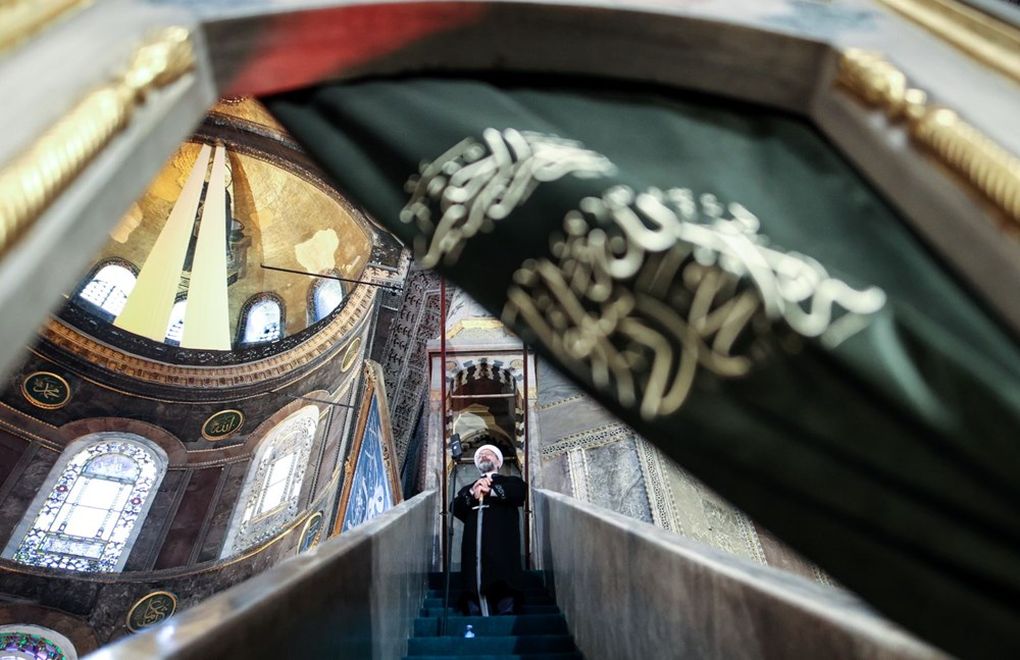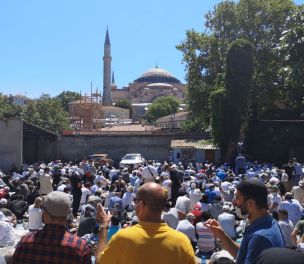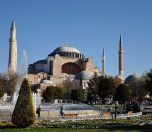Click to read the article in Turkish
The first Eid al-Fitr (Ramadan/ Sugar Feast) prayer was held at the Hagia Sophia Grand Mosque after 87 years today (May 13).
The prayers were led by President of Religious Affairs Prof. Ali Erbaş, who climbed to the minbar (mosque pulpit) while holding a sword.
CLICK - Erdoğan recites Quran at Hagia Sophia, religious authority head gives sermon with sword
Hagia Sophia was used as a church for 916 years. In 1453, it was converted into a mosque by Ottoman Sultan Mehmed II when the empire took over İstanbul. Under the Republic of Turkey, it became a museum.
In a ruling dated July 10, 2020, the Council of State ruled that it should be converted back into a mosque. Hagia Sophia was opened to worship as a mosque following the Friday prayers on July 24.
'Cries raised from Islamic geography'
As reported by the state-run Anadolu Agency (AA), the citizens who wanted to perform the morning prayers and the Eid al-Fitr prayers had come to Hagia Sophia in the early morning hours today.
While a limited number of people were admitted into Hagia Sophia due to the novel coronavirus (COVID-19) measures, some citizens performed the prayers in the mosque courtyard and at the square.
Giving the sermon and leading the prayers, Ali Erbaş said that religious feasts are the days of happiness and enthusiasm for the ones who belong to the same faith, to the same history and to the same civilization.
He also expressed his sadness over "the cries raised from the aggrieved lands of the Islamic geography, from East Turkestan to Yemen, from Arakan to Syria." He put a specific emphasis on what has been happening in Jerusalem and al-Aqsa, the first qibla of the Muslims.
"Not abandoning its aggressive attitude even on Ramadan days, Israel's attempted occupation of the holy land Jerusalem and our first qibla al-Aqsa fill us, all believers, with sorrow and pain," said Erbaş.
He added that "the symbolic city of religions, languages, cultures and civilizations is being plundered."
"Our innocent Palestinian brothers and sisters are evicted from their houses by force, they are subjected to massacres. Therefore, until Palestine and al-Aqsa are completely free, every Eid will be marked in sorrow."
What happened?
Hagia Sophia was used as a church for 916 years. In 1453, it was converted into a mosque by Ottoman Sultan Mehmed II when the empire took over İstanbul. Under the Republic of Turkey, it became a museum.
The Permanent Foundations' Association for Serving Historical Artifacts and Surroundings appealed to the Council of State in 2005, challenging the status of Hagia Sophia in a lawsuit. The association demanded the stay of execution and the annulment of the Council of Ministers decree dated 1934 that paved the way for the Hagia Sophia's conversion into a museum.
The 10th Chamber of the Council of State rejected the request for stay of execution on June 24, 2005. In 2008, it rejected the lawsuit on the grounds that the use of Hagia Sophia as a museum was not against the law.
The Council of State's Plenary Session of Administrative Law Chambers upheld this verdict. The Association filed another lawsuit in 2016.
The Constitutional Court concluded the individual application of the Association in 2018. While the Association claimed that freedom of thought and faith was violated, the court found the application "inadmissible" due to "ratione personae non-jurisdiction without being examined."
The 10th Chamber of the Council of State, on July 10, 2020, announced that it annulled the Council of Ministers Decree which was dated November 24, 1934 and turned Hagia Sophia from a mosque into a museum.
Shortly after this verdict was announced, the Presidential Decree handing Hagia Sophia over to the Presidency of Religious Affairs and opening it to worship as a mosque was published in the Official Gazette.
In the decree of the President published on the Official Gazette on July 10, a reference was made to the annulment of the Council of State.
Hagia Sophia reopened as a mosque on July 24, 2020 with the Friday prayers attended by several top state officials, including Erdoğan. (EMK/SD)






sa.jpg)

